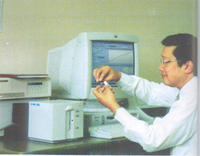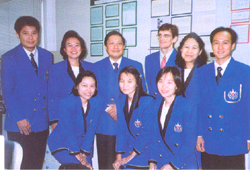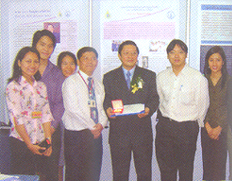|
Professor Dr. M.R. Jisnuson Svasti was born in Bangkok on 25 September
1947, the son of H.R.H. Princess Chandra
and H.S.H. Prince Arjuna Svasti. He
studied in England since the age of
six, attending Cheam School, Rugby
School and Trinity College, Cambridge.
He obtained his B.A. (Hons) degree
and his M.A. degree in Biochemistry
from Cambridge University in 1968
and 1972, and his Ph.D. in Molecular
Biology from Cambridge University
in 1972 under the supervision of the
Nobel laureate, Dr. Cesar Milstein.
He became a staff member at the Department
of Biochemistry, Faculty of Science,
Mahidol University in 1972, and has
been there since, except for 1 year
as a Senior Research at the University
of Texas Medical Branch, Galveston,
U.S.A. He was Chairman of the Biochemistry
Department (1980-1984), Associate
Dean of the Faculty of Science (1996-1997),
and Vice-President for International
Relations of Mahidol University (1997-1999),
and Dean of the Faculty of Graduate
Studies, Mahidol University (2005
- present). He also has a joint appointment
as Head of the Laboratory of Biochemistry
at the Chulabhorn Research Institute
since 1990.

Professor Svasti has has had research
interests in the structure and function
of proteins and enzymes for more than
30 years. He has studied various systems,
beginning with plasma proteins, such
as immunoglobulins (1968-1975) and
plasma vitamin D binding protein (1976-1980).
Later, he became interested in proteins
and specific for the male reproductive
system as possible targets for control
of male fertility (1974 to 1986) and
protein changes in disease (since
1985). Most recently, he has worked
on plant enzymes since 1992.
He established the Center
for Excellence in Protein Structure
and Function at the Faculty of
Science, Mahidol University in 2001.
receiving support from the faculty
for equipment, including X-ray diffractometer
for study of three-dimensional structure
of proteins and stop-flow spectrophoto-meter
for studying enzyme mechanisms. His
own work at Mahidol University now
focuses on studying the structure
and function of plant glycosidase
enzymes and their substrates, expecially
enzymes from Thai plants, such as
cassava. The applications of these
enzymes for synthesizing glycosides
and oligosaccharides are also being
explored. Complementing this study
of structure-function relationships
in protein under normal conditions,
Professor Svasti's Laboratory of Biochemistry
at the Chulabhorn Research Institute
focuses on abnormalities in protein
structure oe expression in disease.
His group was the first group to establish
the novel technique of proteomics
in Thailand, and has used this approach
to study changes in expression in
human cancer, as well as the effect
of cytotoxic agents on cancer cells.
The laboratory also studies various
genetic diseases, such as abnormal
hemoglobins and inborn errors of metabolism,
which are caused by mutations, decreasing
expression or producing defective
protein with little or no activity.
 Professor Svasti has an extensive
network of some 20 research collaborators
in protein structure and function,
including young investigators, from
10 universities and institutions throughout
Thailand, as well as many medical
doctors from several hospitals. He
has also had experience in research
on biochemical education research,
in particular on devising student
laboratories, analysis of curriculum,
and surveys of the status of biochemistry
teaching in Thailand. He has published
106 research articles in international
journals, 20 other academic articles
in international journals (including
biochemical education research and
editorials), as well as 13 academic
articles in Thai, and 3 textbooks
on biochemistry (co-authored). Professor Svasti has an extensive
network of some 20 research collaborators
in protein structure and function,
including young investigators, from
10 universities and institutions throughout
Thailand, as well as many medical
doctors from several hospitals. He
has also had experience in research
on biochemical education research,
in particular on devising student
laboratories, analysis of curriculum,
and surveys of the status of biochemistry
teaching in Thailand. He has published
106 research articles in international
journals, 20 other academic articles
in international journals (including
biochemical education research and
editorials), as well as 13 academic
articles in Thai, and 3 textbooks
on biochemistry (co-authored).
Professor Svasti has been awarded
numerous prizes for research, such
as the Mahidol University Prize for
Excellence in Research (1982) and
the Ministry of University Affairs
(1997), Outstanding Scientist of Thailand
Award from the Foundation for the
Promotion for the Promotion of Science
and Technology under the Patronage
of His Majesty the King (2002), and
the Outstanding Researcher Award in
Chemical Sciences and Pharmacy From
the National Research Council of Thailand
(2003). He has also been honoured
as a university lecturer, receiving
the Outstanding Lecturer Award form
the Faculty Club, Faculty of Science,
Mahidol. University (2003), the Exemplary
Lecturer Award from the Faculty Club,
Mahidol University (2004), and the
Outstanding Lecturer Award from the
Council of the University Faculty
Senates of Thailand (2005).

He has been involved with various
local scientific agencies, including
serving as Chairman (1980-1982) and
Advisory Board Member (1982- Present)
of the Biochemical Section of the
Science Society of Thailand, Editor
of the Journal of the Science Society
of Thailand (1985-1987) and Editor
of ScienceAsia (2001-present), Committee
Member, Biology and Agriculture Section
(1991-1998) and the Chemical Science
and Pharmacy Section (2002-present)
of the National Research Council of
Thailand, and Member of the Thailand
Academy Science and Technology (since
1997). He has also served with several
international organizations, namely
as Coordinating Committee (1979-1981)
of the Asian Network of Biological
Science (ANBS), Treasurer (1980-1986)
and President (1990-1992) of the Federation
of Asian and Oceanian Biochemists
(FAOB). Symposium Committee (1996-2002)
of the International Union of Biochemistry
and Molecular Biology (IUBMB), Governing
Council (1998-present) of the Asia-Pacific
International Molecular Biology Network
(A-IMBN), Membership Committee for
Biochemistry and Biophysics (2001-present)
of the Third World Academy of Science
(TWAS), and Council Member (2003-present)
of the Asian and Oceanic Human Proteome
Organization (AOHUPO), He has been
invited of be an Honorary Member of
the Federation of Asian Biochemists
and Molecular Biologists, and of the
Philippine Society for Biochemistry
and Molecular Biology.
|


 Professor Svasti has an extensive
network of some 20 research collaborators
in protein structure and function,
including young investigators, from
10 universities and institutions throughout
Thailand, as well as many medical
doctors from several hospitals. He
has also had experience in research
on biochemical education research,
in particular on devising student
laboratories, analysis of curriculum,
and surveys of the status of biochemistry
teaching in Thailand. He has published
106 research articles in international
journals, 20 other academic articles
in international journals (including
biochemical education research and
editorials), as well as 13 academic
articles in Thai, and 3 textbooks
on biochemistry (co-authored).
Professor Svasti has an extensive
network of some 20 research collaborators
in protein structure and function,
including young investigators, from
10 universities and institutions throughout
Thailand, as well as many medical
doctors from several hospitals. He
has also had experience in research
on biochemical education research,
in particular on devising student
laboratories, analysis of curriculum,
and surveys of the status of biochemistry
teaching in Thailand. He has published
106 research articles in international
journals, 20 other academic articles
in international journals (including
biochemical education research and
editorials), as well as 13 academic
articles in Thai, and 3 textbooks
on biochemistry (co-authored).